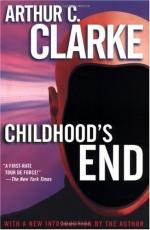|
This section contains 870 words (approx. 3 pages at 400 words per page) |

|
Themes
Several commentators have noted how Childhood's End opposes the intuitive to the rational, the immaterial to the material, and the community to the individual.
The prohibition the aliens deliver, "The stars are not for Man," implies human impotence on the epistemological, sexual, and personal levels. Not only is technology unable to cope with the manifold appearances of the universe, its maker, the analytic mind, is unable. Several of the novel's questers are blind, actually or metaphorically; the insights of the novel are achieved by those characters willing to acquiesce or to sleep.
Most of the protagonists suffer some form of sexual isolation: Stormgren is a widower, Jan has been jilted, and George's marriage becomes a convention.
Their condition is summarized by Rashaverak's description of the Overlords, "We are the midwives. But we ourselves are barren." The only permanent sexual relation is the semimaternal one between Maia and the...
|
This section contains 870 words (approx. 3 pages at 400 words per page) |

|




